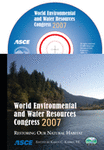Stormwater Polishing: Upflow vs. Downflow Filters
Publication: World Environmental and Water Resources Congress 2007: Restoring Our Natural Habitat
Abstract
One potentially cost-effective approach for stormwater treatment is the treatment of runoff from critical source areas before it mixes with cleaner runoff from `non-problem' areas through the use of technologies such as filtration. In many cases, filtration is seen as the polishing step for water that has already passed through a sedimentation-type treatment device, e.g., the filter acts like a final polisher by treating the remaining dissolved and colloidal pollutants. This research team has compared the operation of the filtration device in both upflow or downflow modes. The question that remains is whether the operational mode of the filter provides substantial differences in performance when the filter is acting as a polisher. Compared to stand-alone filtration units, polishing filters are not challenged by clogging solids. This research performed comparative upflow vs. downflow filtration experiments using a pilot-scale filter setup (filter diameter 0.47 m). The test water was pumped from a stormwater detention pond draining a mostly medium-density residential neighborhood in Hoover, Alabama. Influent turbidities were low (typically < 20 NTU), as were suspended solids (TSS < 15 mg/L). The results showed that for most dissolved/colloidal pollutants the mode of operation was not significant, as long as the flow rate could be controlled to match the required contact time for the desired level of pollutant removal. Therefore, from the designer's point of view, either upflow or downflow filtration could be used for polishing treatment of pre-treated stormwater. The design question of importance is therefore the speed of processing of water (treatment flow rate and associated filter surface area) and whether, over extended times of operation, the downflow filter's treatment flow rate will be reduced to an unacceptable level due to clogging from the remaining particulates in the pretreated water (the upflow filter operation is much less susceptible to clogging).
Get full access to this chapter
View all available purchase options and get full access to this chapter.
Information & Authors
Information
Published In
Copyright
© 2007 American Society of Civil Engineers.
History
Published online: Apr 26, 2012
Authors
Metrics & Citations
Metrics
Citations
Download citation
If you have the appropriate software installed, you can download article citation data to the citation manager of your choice. Simply select your manager software from the list below and click Download.
